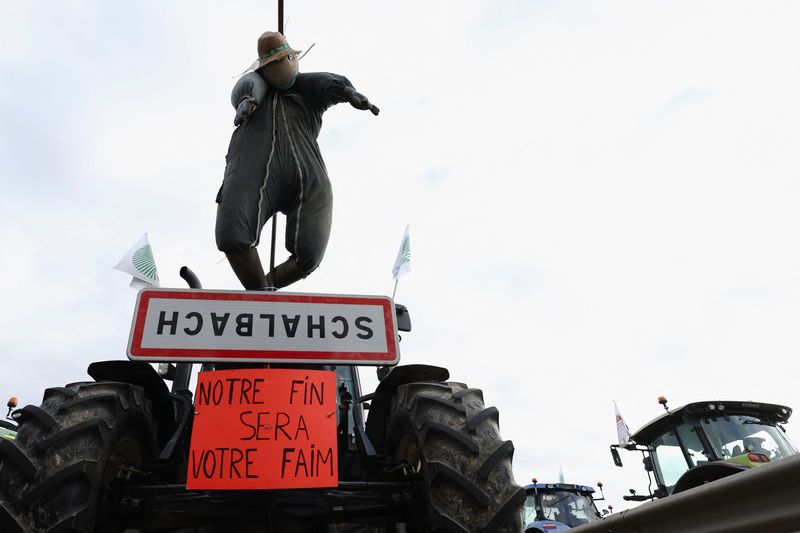
© Reuters. An effigy and a placard reading “Our end will be your hunger” are attached to a tractor as farm vehicles are lined up during a blockade by farmers on the A4 highway to protest over price pressures, taxes and green regulation, grievances that are shared by
2/5
By Marco Trujillo and Philip Blenkinsop
PARIS/BRUSSELS (Reuters) -The French government on Wednesday sent armoured vehicles to protect a wholesale food market in Paris, in a sign of escalating tensions as farmers blocked highways in France and Belgium and protests spread elsewhere in Europe.
Spanish and Italian farmers said they were joining the protest movement, which has also hit Germany, that aims to press governments to ease environmental rules and shield them from rising costs and cheap imports.
With all eyes on a summit of EU leaders set for Thursday, the bloc’s executive Commission made proposals to limit farm imports from Ukraine and loosen some green regulations.
But that was unlikely to be enough to quell the anger of farmers who said they would continue to block highways and ports until all their demands were met.
“What is happening at the moment stems from the accumulation of rules that at first you accept… till it becomes too much,” said Arnaud Rousseau, head of France’s powerful FNSEA union.
While protests have so far been largely peaceful – though French farmers have sprayed liquid manure at local prefecture buildings and set tyres on fire – police arrested 18 people on Wednesday amid standoffs.
Those arrested were driving tractors and trying to block the wholesale food market at Rungis in Paris, a hub for produce for France and beyond, a police prefecture source said. So far, police had let farmers block highways without stepping in.
Interior Minister Gerald Darmanin has warned that while farmers’ protests on highways would be tolerated, police would not allow farmers to block airports or the Rungis market.
In total, there are about 100 blockades, he said.
‘END OF CIVILISATION’
BFM TV showed standoffs near the river Loire, with tractors stopped by police from moving closer to Paris. It also showed tractors leaving roads and rumbling across fields to bypass police.
Farmers say they are not being paid enough, are choked by taxes and green rules and face unfair competition from abroad.
“If we keep on like this, the end of agriculture will mean the end of civilisation,” 28-year-old Belgian farmer Adelin Desmecht said, blaming too much regulation and paperwork.
In Belgium, farmers blocked access roads to the Zeebrugge container port for a second day. A protest organiser who gave his name as Bruno said more than 100 tractors were taking part in the blockade.
A spokesperson for the port of Antwerp-Bruges said farmers had also started blocking trucks from leaving and entering the port of Antwerp, Europe’s second biggest port.
A major highway in Belgium was also blocked.
In Italy, farmers have blocked traffic with hundreds of tractors near motorway access points near Milan, in Tuscany and elsewhere in recent days.
Farmers’ lobby Coldiretti said more than 1,000 of its members would travel to Brussels to take part in a demonstration on Thursday outside the European Parliament.
French farmers have already won several concessions, including the government dropping plans to gradually reduce subsidies on agricultural diesel.
In another step to try to subdue farmer anger, the agriculture ministry announced 230 million euros in additional aid for French wine producers.
UKRAINE IMPORTS
The European Commission on Wednesday proposed limiting agricultural imports from Ukraine.
The proposal, which will require approval from EU governments and the European Parliament, introduces an “emergency brake” for the most sensitive products imported from Ukraine – poultry, eggs and sugar – allowing tariffs if imports exceed the average levels of 2022 and 2023.
It also allows EU members to set temporary measures if their markets are disrupted by a surge in imports of other farm produce.
The Commission also proposed exempting farmers for 2024 from a requirement to keep a minimum share of their land fallow while still receiving EU subsidies – another key request for farmers.
Imports from Ukraine, on which the EU has waived quotas and duties since Russia’s February 2022 invasion, and renewed talks on concluding a trade deal with South American nations in the Mercosur bloc, have fanned farmers’ discontent over what they see as unfair competition.
French Finance Minister Bruno Le Maire repeated that Paris does not want the deal to be signed as it is now, due to a lack of guarantees that imported products would have to meet EU rules. But the European Commission has said it still aims to conclude the free trade agreement.
The protests across Europe come ahead of European Parliament elections in June in which the far right, for whom farmers represent a growing constituency, is seen making gains.


